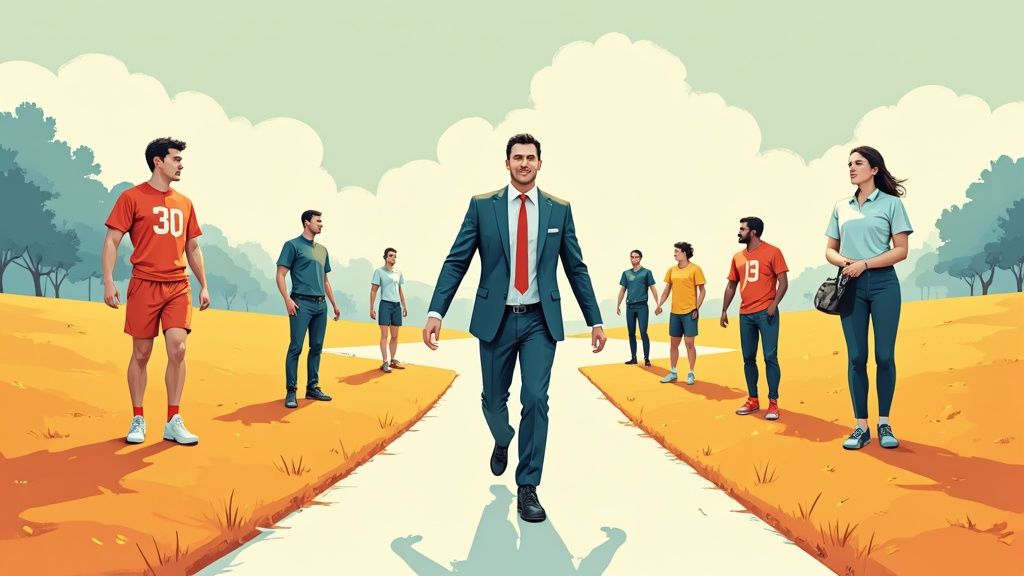Unlock Success: Mastering the Role of a Coach


The Transformative Role of a Coach: Beyond the Basics

The role of a coach is often misunderstood. Many see it as simply providing instruction or giving directions. However, true coaching transcends these basic functions. It's a multifaceted role, guiding individuals to unlock their full potential, fostering lasting transformation, and achieving meaningful goals. This applies whether the context is athletic, corporate, or personal.
The Coach as a Facilitator of Growth
Effective coaches don't offer ready-made solutions. Instead, they facilitate self-discovery. They help individuals identify their strengths and weaknesses, clarify their objectives, and develop strategies to overcome obstacles. This empowers individuals to take ownership of their development.
Coaches might use powerful questions to encourage reflection and critical thinking, rather than providing direct answers. This cultivates self-sufficiency and resilience.
The Coach as a Strategist and Mentor
Coaching also involves strategic thinking. Coaches help individuals develop a clear vision for their future and map a path to reach it. They act as mentors, providing guidance and support based on their experience and expertise.
Offering encouragement and accountability, coaches keep individuals focused and motivated. They celebrate successes and help individuals learn from setbacks.
The Coach in Human Resources
The role of a coach is also vital in the business world, particularly within Human Resources. Coaching is crucial for employee development and organizational success. It improves individual performance and contributes to overarching company goals.
Human Resource Management (HRM) now recognizes coaching as integral to talent management and organizational design. Focusing on employee engagement can significantly enhance organizational performance. Research indicates companies with engaged employees see profit margins almost three times higher than those with disengaged employees. Find more detailed statistics here.
The Coach as a Catalyst for Change
Ultimately, the most impactful coaches inspire lasting change. They don't offer temporary fixes. They equip individuals with the skills, mindset, and confidence to achieve sustained growth and success in all areas of their lives. This transformative power separates exceptional coaches from mere instructors, showcasing the true depth and significance of their role.
The Role of a Coach in Athletic Excellence

Coaching is much more than just calling plays from the sidelines. It's a multifaceted role that blends technical knowledge, strategic thinking, and interpersonal skills to develop athletes and teams. This involves understanding the nuances of the sport, crafting effective training programs, and fostering a positive and productive environment.
Building Technical Excellence and Mental Resilience
Coaches are essential for developing technical excellence in athletes. This means refining the specific skills needed for a given sport. A tennis coach, for instance, will focus on serve technique, footwork, and court coverage. Meanwhile, a track and field coach might concentrate on sprinting form, jumping technique, or throwing mechanics.
But technical skills are only part of the equation. Coaches also cultivate mental resilience, the ability to overcome obstacles, handle pressure, and stay focused. This involves building confidence, promoting a positive mindset, and teaching athletes how to cope with the challenges of competition.
Methodologies for Consistent Performance
Effective coaches utilize various strategies to help athletes translate potential into consistent high-level performance.
Team Cohesion: Building a strong team dynamic is crucial. This means creating an environment of trust and mutual respect, encouraging open communication, and fostering a sense of shared purpose among team members.
Character Development: Coaches instill essential values like discipline, integrity, and sportsmanship. They act as role models, demonstrating these qualities both on and off the field. This helps athletes grow not just as competitors, but also as individuals.
Psychological Preparation: Mental preparation is as vital as physical training. Coaches help athletes develop strategies for managing stress, maintaining focus, and performing under pressure. This may include techniques like visualization, mindfulness, or goal setting.
Adapting Strategies Across Competitive Levels
Coaching approaches differ depending on the athletes' level of experience and the competitive landscape. Youth coaches prioritize skill development and fostering a love for the sport. As athletes progress, the focus shifts towards more advanced techniques, tactical awareness, and competitive strategies.
At the elite level, coaching becomes increasingly specialized, requiring a deep understanding of the sport, sophisticated analytical abilities, and the skills to manage high-pressure situations. Regardless of the level, effective coaching centers around building strong relationships, promoting positive growth, and instilling ethical behavior.
To illustrate the varying approaches, let's examine the following table:
Sports Coaching Impact Across Levels
This table compares the different focuses and impacts of coaching across various levels of sports participation.
| Coaching Level | Primary Focus | Key Responsibilities | Impact Metrics |
|---|---|---|---|
| Youth | Skill development, fun, and participation | Introducing basic skills, creating a positive learning environment, building confidence | Increased participation, improved motor skills, development of a positive attitude towards sports |
| High School/Amateur | Refining skills, tactical understanding, competitive preparation | Developing advanced techniques, implementing game strategies, building teamwork and leadership skills | Improved performance, competitive success, college recruitment potential |
| Professional/Elite | Maximizing performance, strategic advantage, managing elite athletes | Expert analysis of opponents, individualized training programs, managing athlete well-being and media relations | Championship titles, individual accolades, endorsements, career longevity |
The table showcases the evolving focus and responsibilities of coaches across different levels, reflecting the increasing demands and specialized skills required at each stage.
A coach's success is measured not just by wins and losses, but also by the athletes' overall development. A UK Coaching survey of over 30,000 adults highlighted the significant impact of coaching on participation and skill development across all levels. The best coaches nurture well-rounded individuals, equipping them with skills and values that extend far beyond the playing field.
Leadership Mastery: The Coach as Catalyst for Greatness

What separates a truly exceptional coach from the rest? It's not simply about the final score, but the profound and enduring influence they have on individuals and teams. The coach's role often centers around fostering a culture of excellence, built upon strong leadership principles that reach far beyond the game or the meeting room. This section explores the key leadership qualities that characterize remarkable coaches and how they build lasting legacies of success.
Creating a Culture of High Standards
Exceptional coaches recognize that achieving greatness requires establishing high expectations. But it's not enough to just demand top performance. They must cultivate environments where these standards become ingrained within the team. This involves nurturing a sense of ownership and dedication, where every individual is driven to reach their full potential. For example, a coach might encourage team members to establish their own objectives, promoting intrinsic motivation and a stronger sense of responsibility.
Balancing Accountability and Autonomy
Accountability is essential, but great coaches also understand the significance of autonomy. They find the right balance between providing direction and empowering individuals to take charge of their own growth. This includes delegating responsibilities and granting team members the freedom to make decisions within a defined structure. This fosters creativity, sharpens problem-solving abilities, and builds a sense of self-reliance. It's similar to the adage of teaching someone to fish rather than giving them a fish; it equips them with the skills they need for enduring success.
Transforming Organizational Cultures
The impact of a skilled coach frequently extends beyond individual development, influencing entire organizational cultures. This ripple effect stems from the fact that effective coaching cultivates essential values like collaboration, communication, and a commitment to continuous improvement. These principles then become woven into the very fabric of the organization, contributing to sustained success and a positive working atmosphere.
Consider the impact of coaching in the realm of sports, particularly basketball. The University of Kentucky's men's basketball team, under the guidance of coaches like Adolph Rupp and John Calipari, exemplifies this. Rupp coached for 41 years, achieving a remarkable win-loss percentage of .822, while Calipari has maintained a .769 win-loss percentage over his 15-year tenure. Their leadership has been instrumental in the team's consistent success. Explore this topic further.
Building Enduring Coaching Philosophies
Finally, truly great coaches cultivate coaching philosophies that can withstand pressure and the passage of time. They possess a deep understanding of their core values and principles, enabling them to adapt their strategies while remaining true to their overall vision. These philosophies serve as their guiding compass, influencing their decisions and shaping their enduring legacy. This consistent approach builds trust and creates a sense of stability, particularly crucial in high-stakes situations. It's about developing principles that go beyond any single win or loss, concentrating on the long-term growth and development of individuals and teams. This focus on sustainable growth creates a legacy that transcends any individual victory.
The Role of a Coach in Professional Transformation

The role of a coach in professional development goes far beyond simple motivation. It's about facilitating measurable growth and tangible results in the workplace. This involves guiding individuals through complexities, helping them achieve specific objectives, and ultimately transforming their careers.
Navigating the Delicate Balance: Challenge and Support
Effective professional coaches understand the crucial balance between challenge and support. They push their clients beyond their comfort zones to reach higher levels of achievement. At the same time, they provide the necessary support and encouragement to help clients navigate challenges and build confidence.
For instance, a coach might encourage a client to lead a complex project that expands their skill set. The coach would then offer consistent guidance, resources, and feedback, empowering the client to succeed. This combined approach of challenge and support is fundamental to professional growth.
Methodologies for Unlocking Potential
Leading business coaches use established methodologies to help clients realize their full potential. These methods go beyond generic advice, incorporating practical tools and targeted techniques.
Decision-Making Confidence: Coaches work with clients to develop structured decision-making processes, reducing uncertainty and bolstering their confidence.
Strategic Thinking: Coaches guide clients in developing a long-term vision and strategic plans that align personal goals with overall organizational objectives.
Authentic Leadership Presence: Developing an authentic leadership style is key. Coaches help clients cultivate leadership skills that build trust and inspire teams.
These methodologies aim to empower individuals to become proactive problem-solvers, fostering resilience and adaptability in dynamic work environments.
Coaching Cultures and Competitive Advantage
Organizations that embrace coaching cultures often gain a competitive edge. This isn't simply a coincidence. A robust coaching culture cultivates specific benefits that translate to tangible business results.
Innovation: Coaching encourages creative thinking and calculated risk-taking, leading to more innovation within the organization.
Talent Retention: Providing employees with coaching opportunities for growth and development increases job satisfaction and reduces employee turnover.
Adaptability: Coaching equips individuals with the skills and mindset needed to navigate change and adapt to evolving business landscapes.
Companies with strong coaching programs are better equipped for success. They are more likely to attract and retain top talent, create a culture of innovation, and exhibit greater resilience in a changing market.
Distinguishing Coaching from Management
It's important to differentiate coaching from traditional management. While both are valuable, they serve different purposes. Management generally focuses on directing work processes and ensuring efficient task completion. Coaching, however, concentrates on developing individual potential and promoting long-term growth.
A coach guides and supports, while a manager directs and oversees. Coaching addresses the broader aspects of professional transformation, including skill development, leadership growth, and overall career advancement. This holistic approach reinforces the coach's role as a catalyst for sustained professional success.
The Coaching Toolkit: Techniques That Actually Work
Professional transformation, athletic excellence, and leadership mastery often rely on effective coaching. But what makes coaching truly effective? This section explores the practical tools and strategies that drive success across various coaching disciplines. We'll examine the methods that help individuals achieve goals, overcome limitations, and reach their full potential.
Questioning Frameworks That Unlock Breakthroughs
A coach's questioning style can be transformative. Skilled coaches use specific questioning frameworks to guide individuals toward self-discovery.
These frameworks include:
Open-ended questions: These encourage thoughtful responses and deeper exploration. Instead of asking, "Are you happy with your progress?", a coach might ask, "How do you feel about the progress you've made so far?"
Solution-focused questions: These questions point toward actionable steps. An example is, "What's one small change you could make today?"
Reflective questions: These prompt introspection. For example, a coach might ask, "What impact did that choice have on your performance?"
These techniques help individuals uncover their own answers and develop self-awareness, essential for lasting change.
Feedback Delivery That Inspires
Feedback is vital for growth, but its delivery significantly impacts its effectiveness. Coaches must provide feedback that motivates rather than discourages.
Effective feedback involves:
Focusing on behavior, not personality: Critique actions, not the individual. Instead of saying, "You're disorganized," a coach might say, "I've noticed deadlines have been challenging lately. Let's explore some strategies to improve time management."
Balancing constructive criticism with positive reinforcement: Acknowledging strengths alongside areas for improvement fosters a growth mindset.
Framing feedback as a learning opportunity: This helps individuals view setbacks as stepping stones to success.
Goal-Setting Approaches That Achieve Results
Transforming aspirations into reality requires a strategic approach to goal setting. Effective coaching involves guiding individuals through a structured process. Popular techniques include:
SMART goals: Creating goals that are Specific, Measurable, Achievable, Relevant, and Time-bound provides clarity.
Action planning: Breaking down large goals into smaller steps makes the process less overwhelming.
Regular progress reviews: Monitoring progress helps individuals stay motivated and adjust their approach as needed.
These goal-setting methods empower individuals to take concrete actions toward their objectives.
Adapting Techniques to Different Learning Styles and Personalities
Every individual learns and responds differently. Some learn by doing (kinesthetic learners), others by reflecting (reflective learners), and still others through visual or auditory means.
A skilled coach adapts their methods to suit each person's unique learning style and personality. This personalized approach maximizes the impact of coaching, building trust and creating a safe space for growth. Just as a gardener adjusts their care based on the specific needs of each plant, so too does an effective coach tailor their techniques.
To further illustrate the different applications of coaching skills, let's examine the following comparison:
Key Coaching Skills Comparison: This table compares essential coaching competencies across different coaching contexts.
| Coaching Skill | In Sports | In Business | In Personal Development | Impact |
|---|---|---|---|---|
| Questioning | Used to understand athlete's mindset, identify areas for improvement, and motivate performance. | Used to clarify goals, explore challenges, and facilitate problem-solving. | Used to promote self-reflection, identify limiting beliefs, and encourage positive change. | Drives self-discovery and empowers individuals to find their own solutions. |
| Feedback Delivery | Focused on technique, strategy, and physical conditioning. | Addresses performance, communication, and leadership skills. | Focuses on personal growth, relationships, and overall well-being. | Guides behavior change and promotes continuous improvement. |
| Goal Setting | Centered on athletic performance, skill development, and competition. | Related to business objectives, career advancement, and team performance. | Addresses personal goals, life changes, and self-improvement. | Provides direction and fosters a sense of accomplishment. |
| Adapting Techniques | Considers athlete's physical abilities, learning style, and personality. | Accounts for individual work styles, communication preferences, and motivational factors. | Tailored to individual needs, learning styles, and personal circumstances. | Creates a supportive and effective coaching relationship. |
This table highlights how core coaching skills, while fundamentally similar, are applied differently across various contexts. The adaptability of these skills is key to their effectiveness in helping individuals achieve their goals, whether on the field, in the boardroom, or in their personal lives.
The Evolving Role of a Coach: What's Next?
The role of a coach is constantly changing, shaped by technological advancements and a growing understanding of human potential. This evolution presents exciting new possibilities, but also distinct challenges for coaches in every discipline.
AI and Neuroscience: Transforming Coaching Practices
Emerging technologies, like AI-enhanced performance analytics, are giving coaches an unparalleled view into individual behaviors and performance. These tools can track an individual's progress, pinpoint areas for improvement, and create personalized coaching strategies. Furthermore, brain-based coaching methodologies, rooted in neuroscience, provide new insights into learning, information processing, and achieving peak performance. This knowledge helps coaches design more effective interventions and maximize client outcomes.
However, the integration of technology brings important questions. Are these innovations truly beneficial, or simply hype? It's important to distinguish between tools that genuinely improve coaching and those that add unnecessary complexity without real value.
Virtual Coaching: Breaking Barriers, Building Connections
Virtual coaching platforms have revolutionized access to coaching, overcoming geographical barriers and connecting coaches with clients worldwide. This increased accessibility has broadened the impact of coaching and made it more convenient for those seeking support. But virtual coaching has its own set of obstacles. Building trust and presence in a digital space requires coaches to develop new skills and adapt their communication. Coaches need to master video conferencing, online collaboration tools, and other digital resources to cultivate strong client relationships.
Cultural Responsiveness and Emotional Intelligence
In today's diverse world, coaches must embrace culturally responsive practices. Understanding the needs and challenges of people from different backgrounds is crucial for building effective coaching relationships. This requires coaches to develop cultural sensitivity, empathy, and the ability to tailor their approach for diverse populations. While technology provides valuable assistance, emotional intelligence remains paramount. The core human element of coaching—connecting with others personally, understanding their emotions, and fostering rapport—cannot be replaced by algorithms or data. Even with technological advances, the fundamental human connection at the heart of coaching remains essential.
Are you ready for the future of coaching? Visit Coaching Hub for helpful resources, insights, and community support as you navigate this evolving field.